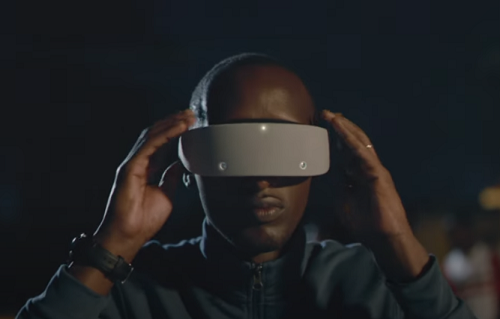Social Media
Meta Releases New Metaverse Promo Amid Rising Criticism of its Future Vision
- By Brett Belau
23 Aug

Meta’s metaverse might look a little unfinished right now despite the billions that Meta is pouring into it, but Meta CEO Mark Zuckerberg says that it will evolve beyond dead-eyed, legless avatars and basic depictions, with improvements on both fronts coming soon.
And today, Meta has released a new promo campaign to highlight how it sees the metaverse changing the way that people connect.
As you can see, the new campaign focuses on cycling group Team Amani from East Africa, which currently utilizes Meta’s family of apps to stay connected amid their varying training schedules. But in future, in the theoretical metaverse, Meta’s tools will open up all new connective and participatory opportunities, and even entirely new forms of competition, which will enable all people to take part from anywhere, via fully immersive digital environments.
Which looks cool, no doubt, and certainly there would appear to be significant opportunity in this new (virtual) reality. But it’s still a long way off being a tangible thing, and the challenge that Meta has now is that it needs to maintain enthusiasm for this future vision, while also telling people that it has no idea when any of it will actually become a reality.
Because really, the technical and practical limitations here are significant, and will require significant development to overcome.
Take VR in isolation, which is currently the gateway to Meta’s metaverse plan. As you can see at the 30-second mark of this video, these athletes are using what appears to be Meta’s yet-to-be-released ‘Cambria’ VR headset, which will include advanced elements to improve VR interactivity.
The Cambria headset is slated for release sometime this year, at a price point of around $800 – though more recent estimates have put it at more like $1,000 due to rising supplier and component costs.
That would price it beyond the reach of most people, and with no compelling reason to pay up – i.e. no must-have games or VR experiences, beyond Meta’s metaverse, which, as noted, isn’t looking great, it doesn’t seem like Cambria is going to be a big seller.
So while Meta’s metaverse may well be capable of more than this:
No one’s going to be able to find out, unless Meta can facilitate broader take-up of Cambria headsets, in order to facilitate that connection.
In other words, the metaverse is not going to see mass adoption for some time yet. And this is just the consumer buy-in aspect.
That also highlights why missteps like Zuckerberg’s post above can be costly, because they feed into the idea that the metaverse is never going to take off, and that Zuck and his crew are living in their own fantasy land, when the reality is much different.
Meta’s VR experience is much better than this picture looks, I can attest, and the fact that you can access its virtual worlds via an untethered headset is a technological feat in itself. But I’m not sure that Meta’s going to be able to keep posting far off visions like those shown in the new campaign, and expect people to maintain any level of excitement about its projects, when they are simply not close to being a reality.
Indeed, it’s important to note the disclaimer at the bottom of the video clip:
‘Reflects aspirational future capabilities’.
None of these screenshots and video depictions are real just yet, and they’re not actually close to being accessible to you or I.
So why did Meta go so early, and announce its big metaverse push, when it’s clearly nowhere near ready to release any of its key, foundational elements?
Because Meta is sinking billions into metaverse development, and it needs to keep spending in order to bring it to fruition. Eventually, shareholders will want to see where that money is going, which is why Meta is drip-feeding these future glimpses, in the hopes that it will help it maintain goodwill as it continues to spend.
But the more I see, the more I remember Magic Leap, and this video clip:
Looks amazing, right? It was amazing enough to win Magic Leap over a $1 billion in funding, at a $2 billion valuation – but thus far, Magic Leap has produced very little in terms of consumer AR or VR devices, and recently pivoted to business use instead.
Will Meta’s metaverse go the same way, with amazing examples of an immersive future, though little, in reality, that connects with that vision?
I would still back Meta to make it happen, but I’m not sure that these examples truly help to advance its cause at this stage.
Source: www.socialmediatoday.com, originally published on 2022-08-22 20:26:19
Connect with B2 Web Studios
Get B2 news, tips and the latest trends on web, mobile and digital marketing
- Appleton/Green Bay (HQ): (920) 358-0305
- Las Vegas, NV (Satellite): (702) 659-7809
- Email Us: [email protected]

© Copyright 2002 – 2022 B2 Web Studios, a division of B2 Computing LLC. All rights reserved. All logos trademarks of their respective owners. Privacy Policy

![How to Successfully Use Social Media: A Small Business Guide for Beginners [Infographic]](https://b2webstudios.com/storage/2023/02/How-to-Successfully-Use-Social-Media-A-Small-Business-Guide-85x70.jpg)



![How to Successfully Use Social Media: A Small Business Guide for Beginners [Infographic]](https://b2webstudios.com/storage/2023/02/How-to-Successfully-Use-Social-Media-A-Small-Business-Guide-300x169.jpg)


Recent Comments